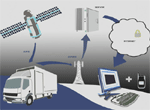
Vehicle tracking systems have only come to the forefront of fleet management in the last few years. Companies can now realistically afford to pay for technology to track each vehicle in their fleet. Indeed, even small businesses are now looking towards tracking systems to improve efficiency and lower costs. In this article we will look at the benefits of tracking systems for different types of small companies and discuss the cost implications of such systems.
The Benefits of Vehicle Tracking
More and more small businesses are investing in tracking systems for their vehicles in order to improve staff efficiency and customer relations. Delivery companies can particularly benefit from the technology as they are able to locate individual vehicles at any one time. This allows them to give a much more accurate time of delivery to a customer. If there are delays, the company can notify the customer immediately which often helps to placate them. Other business types can benefit from improvements in staff efficiency which often results after tracking software is introduced. The employer can see where each of his or her drivers are at any given time and the drivers themselves will be aware they are being watched. This means they are less likely to take unscheduled breaks or deviate from the fastest route.
In certain circumstances, tracking systems act as a back up to drivers to prove they were in a certain place at a certain time. For example, if a customer claims a driver did not make a delivery on time, an employer can pinpoint the exact time the driver did arrive. Tracking systems also promote safer driving as the software can detect speeds. Therefore drivers are much more likely to drive responsibly which improves the public image of a company.
The Cost of Vehicle Tracking Systems
There is little doubt that vehicle tracking for small business has numerous benefits but many smaller companies are put off by the initial cost. Indeed, tracking systems cost thousands of pounds to install and even for a relatively small fleet of 20 vehicles the cost can exceed £5,000. Systems can be loaned at between £10 and £20 a month per vehicle. However, long term savings are likely to be made. More efficient driving will lead to lower fuel bills and more efficient staff will cut down bogus overtime claims. Even small companies can save around £4,000 a year after installing fleet tracking systems.
Vehicle tracking for small business makes sense and in theory every type of company which has a fleet of vehicles will benefit from a system. The ability to locate each individual driver at any given time improves customer relations and employee efficiency. More efficient driving means less accidents, lower fuel bills and a better public image for your company. Small companies have smaller budgets so many may initially be deterred from installing such a system because of their cost. However, after just a few years the savings made by the technology will negate the initial outlay. Vehicle tracking, although expensive, will soon become the norm for companies with a fleet of vehicles irrespective of their size.
Oliver Ortiz works for Expert Market which is a division of MVF Global. Find him on Twitter @OliOrtiz7 if you would like to talk to him. Expert Market is a UK based provider of a wide variety of business related equipment and services. Follow Expert Market on Twitter and connect with Expert Market on Facebook.
